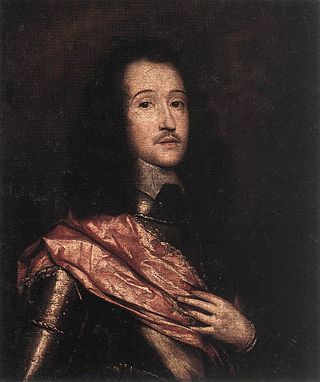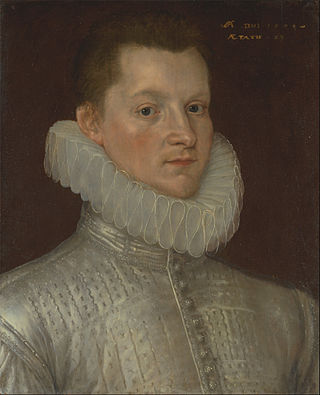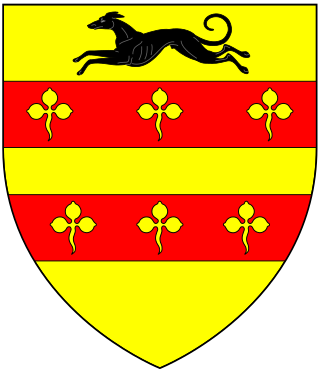
Richard Lovelace was an English poet in the seventeenth century. He was a cavalier poet who fought on behalf of Charles I during the English Civil War. His best known works are "To Althea, from Prison", and "To Lucasta, Going to the Warres".
Sir Richard Baker was a politician, historian and religious writer. He was the English author of the Chronicle of the Kings of England and other works.
Sir Robert Bell SL of Beaupré Hall, Norfolk, was a Speaker of the House of Commons (1572–1576), who served during the reign of Queen Elizabeth I.

Bethersden is a village and civil parish in the borough of Ashford in Kent, England, 5 miles (8 km) west of the town of Ashford. Located on the main road, A28, between Tenterden and Ashford.
Sir Philip Hales, 5th Baronet, of Beakesbourne in Kent, was an English courtier and Member of Parliament.

Thomas Smythe or Smith of London, Ashford and Westenhanger, Kent was the collector of customs duties in London during the Tudor period, and a member of parliament for five English constituencies. His son and namesake, Sir Thomas Smythe, was the first governor of the East India Company, treasurer of the Virginia Company, and an active supporter of the Virginia colony.
Sir Henry Finch was an English lawyer and politician, created serjeant-at-law and knighted, and remembered as a legal writer.

Sir Edward Dering, 6th Baronet was a British politician who sat in the House of Commons between 1761 and 1787.
Sir James Oxenden, 2nd Baronet, of Dene, Kent was an English politician who sat in the House of Commons between 1679 and 1702.
Sir William Hardres, 4th Baronet of Hardres Court, Upper Hardres, Kent was a British landowner and Tory politician who sat in the House of Commons in two periods between 1711 and 1735.

Sir Moyle Finch, 1st Baronet JP was an English politician, knight, sheriff, and MP.

Sir John Fogge was an English courtier, soldier and supporter of the Woodville family under Edward IV who became an opponent of Richard III.
Sir Thomas Fogge was an English politician and soldier.

John Hales, of The Dungeon in the parish of St. Mary Bredin, Canterbury, Kent, was an administrator, politician and judge who was appointed a Baron of the Exchequer in 1522.

Sir John Smith or Smythe, JP, of Westenhanger, Kent, was an English politician.
Simon Lowe, alias Fyfield, was a rich English merchant tailor in the City of London, and also a landowner in several counties, briefly one of the members of the House of Commons of England representing two boroughs in other parts of England.
Sir Robert Drury of Hedgerley and Chalfont St Peter, Buckinghamshire, was the second son of Sir Robert Drury, Speaker of the House of Commons, and was the father of Sir Robert Drury (1525–1593), Sir William Drury, and Sir Drue Drury.

Sir James Palmer was an English Member of Parliament and Chancellor of the Order of the Garter.
Sir William Barne was an English landowner and politician from Kent.
Sir William Lovelace (1561–1629), of Lovelace Place, Bethersden and Greyfriars, Canterbury, Kent, England, was the member of parliament (MP) for Canterbury, elected in 1614.









